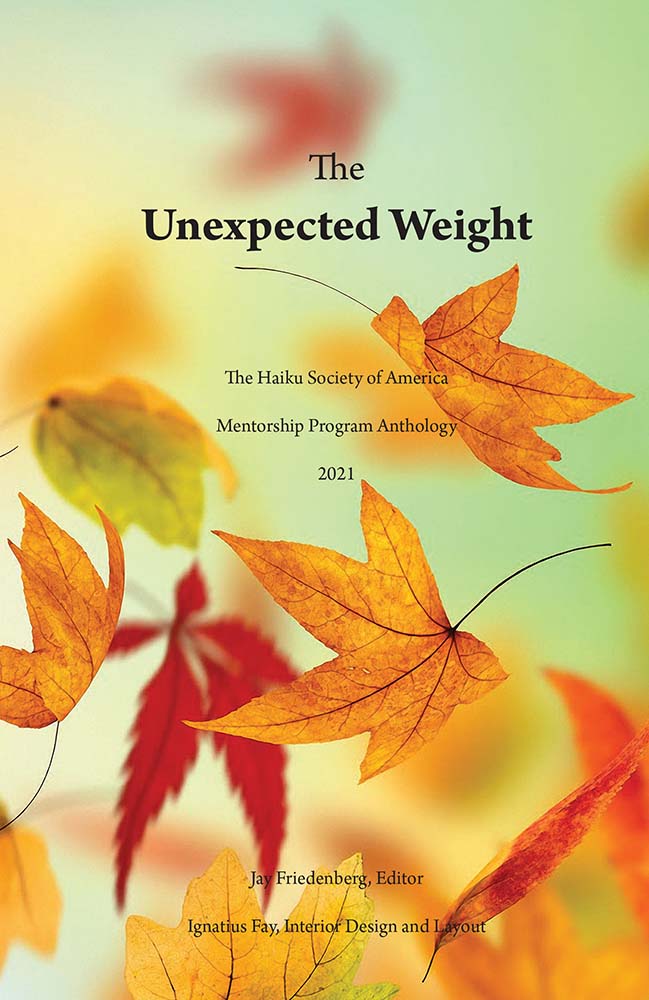Haiku Society of America
~ ~ ~
Haiku Society of America
Mentorship Program Anthology

Friedenberg, Jay, Editor. The Unexpected Weight: The Haiku Society of America Mentorship Program Anthology 2021. Design and layout by Ignatius Fay. Haiku Society of America, 2021. ISBN 978-0-930172-14-5
From the introduction:
Welcome everyone to the first publication of the HSA Mentorship Program Anthology! This volume collects the biographies of all participants, the top three poems of each student as selected by the instructor, and comments by mentors and mentees on their experience. If a poem was published in a journal or accepted into a contest, that is so indicated. The anthology is divided into sections, each corresponding to an individual group. Sections are ordered by the mentor’s last name. A participant list is provided at the end with the page number of each contributor listed. Please note that not every member was able to provide program commentary. Most groups contain four students, but due to attrition and other circumstances, some contain fewer.
The purpose of this mentorship program is to allow our members to learn more about Japanese poetic forms under the close tutelage of an accomplished poet and to establish social ties within the larger English language haiku community. Discussions have centered mostly on haiku and senryu, but a number of mentors have reviewed other forms like haibun, haiga, and renku. In a few cases, instructors have supplemented the traditional critique with alternate types of teaching.
The credit for this program does not lie with me. It was established on a smaller scale by David Lanoue when he was the organization’s President from 2013 to 2015. The current program first began in August 2020 with a small number of groups, but has expanded considerably since then. This anthology covers more than a year’s worth of work and for some groups includes poems written in the latter half of 2020, as well as 2021. At our peak, we had 24 full-time instructors and 84 students. Participants come from across the globe, with some hailing from Europe, Africa, and Asia. A small number of the initial groups have since dissolved, but new ones are continually emerging.
Given pandemic restrictions, all meetings have been virtual, being done over Zoom, Skype, or some other form of digital hosting media. Most of the groups meet once a month for about an hour or more, although some get together more frequently than that. When making assignments, I made an attempt to group people from similar or adjacent time zones together to facilitate scheduling. The meetings were at the outset designed to be workshops not lectures. Students first present poems they have written. These are then constructively critiqued and commented upon by the instructor and other group members. It was stressed early on that all students should be given the opportunity to present the same number of their poems in a given session and be given the same amount of time and attention.
The program is evaluated every year. Members are sent an online survey to complete and asked to indicate what they like or dislike about it, along with suggestions on how to improve. We thought it would be good to solicit for this first volume what the participants enjoyed about their experience. Many said it allowed them to appreciate better the beauty of the world around them, to improve their haiku writing skills, to learn more about the genre, and to form close bonds with others of like-minded interest. Quite a few praised the qualities of their mentor. Although the experience of the students varied, the quality of their writing regardless of starting level seems to have improved rapidly. Some who had never written a haiku before found themselves publishing in high-level journals just a few months later. Several are actively submitting to, and in some cases winning, haiku contests.
The title of this first volume is “The Unexpected Weight” and is the middle line from one of Helen Ogden’s three contributions. I chose this poem for several reasons. First of all, it is an excellent senryu, having won Honorable Mention in the 2021 HSA Brady Memorial Contest. Second, in this time of pandemic and social upheaval, we are all experiencing an unexpected weight. Our expectations have been upended and what we once took for granted no longer is. But life goes on and will get better. It has been a pleasure to organize and see this vibrant community of haiku poets develop. My thanks go out to the mentors for your dedication to the craft and for expending the necessary time and energy. Congratulations to the mentees also for your interest and participation, and to the HSA Executive Committee for approving and providing financial support to this venture. The increase in talent over the last year and a half has been like watching a garden blossom and grow. May this garden thrive and bear fruit for many years to come!
It has been a pleasure to organize and see this vibrant community of haiku poets develop. My thanks go out to the mentors for your dedication to the craft and for expending the necessary time and energy. Congratulations to the mentees also for your interest and participation, and to the HSA Executive Committee for approving and providing financial support to this venture. The increase in talent over the last year and a half has been like watching a garden blossom and grow. May this garden thrive and bear fruit for many years to come!
~Jay Friedenberg President, Haiku Society of America
Requests for information about the program or to join may be sent to: jay.friedenberg@gmail.com
~ ~ ~